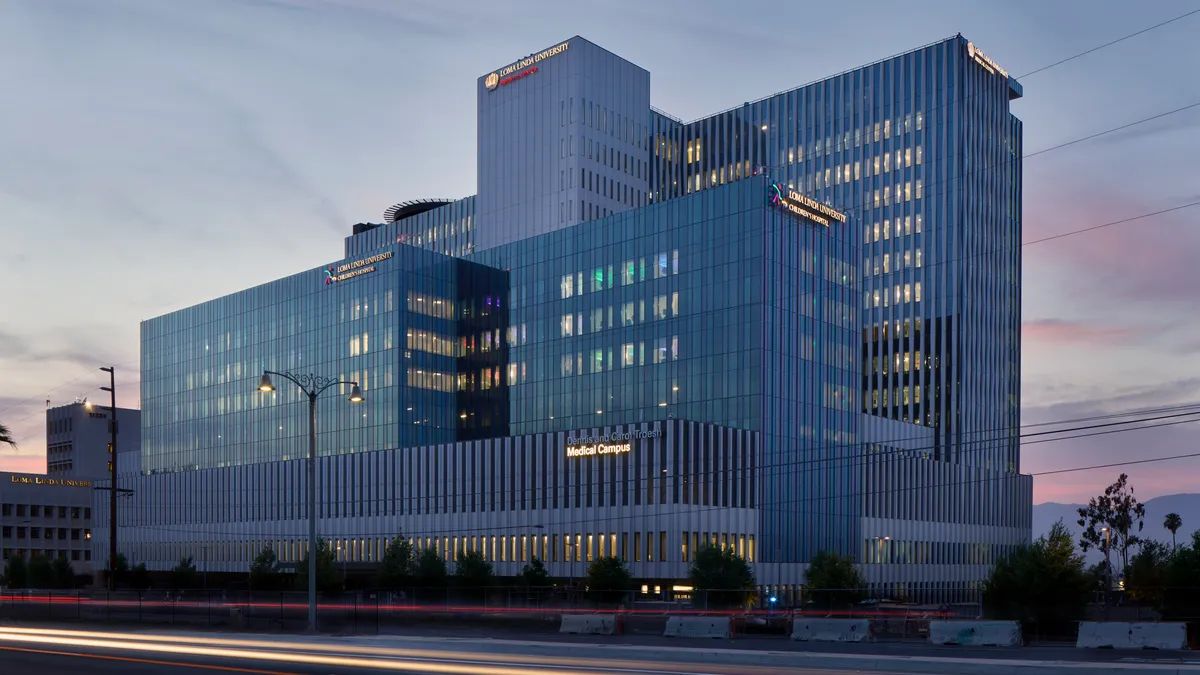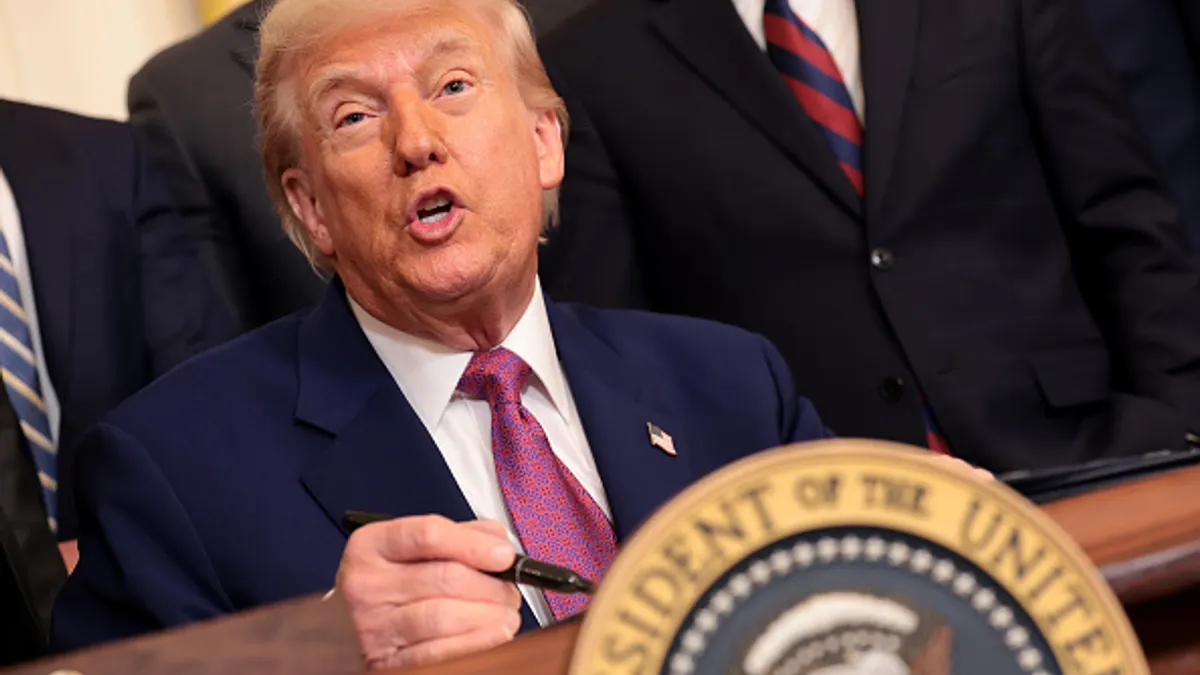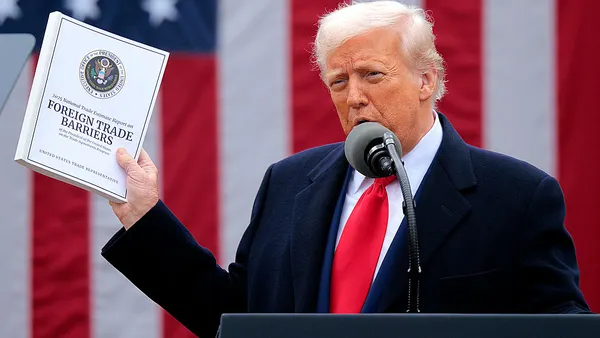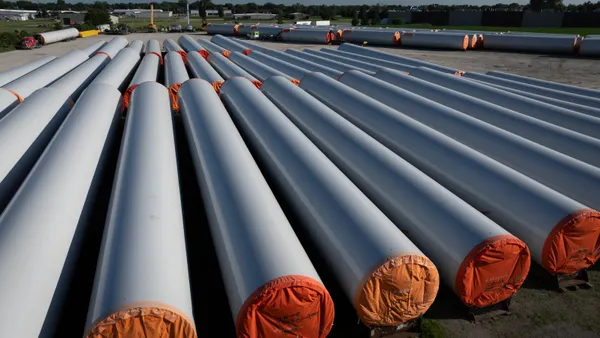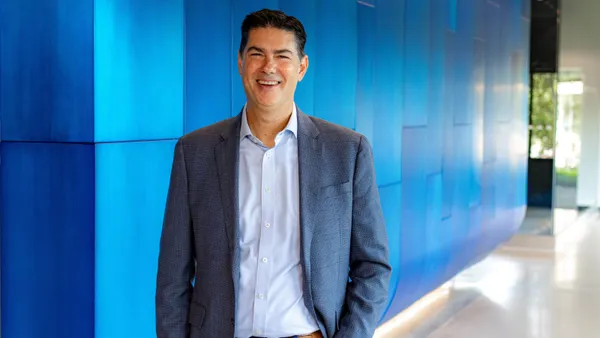Kristine Newman got started at McCarthy — her first job in construction — by discovering a posting on Monster.com. Seventeen years later, on April 8, the St. Louis-based contractor announced Newman’s appointment to CFO.
Prior to McCarthy, Newman began her career at Arthur Anderson LLP, working on audit and consulting engagements. After more than a decade as a controller for McCarthy’s Southwest Region, Newman was promoted to a vice president position in 2016.
McCarthy, which ranked No. 19 in ENR’s top 400 contractors 2021, is employee owned. The builder has locations around the country, working on projects in sectors like hospitality, education and healthcare – such as the Loma Linda University Medical Center in California (pictured above).
Here, Construction Dive talks with Newman about the biggest issues the industry faces as she steps into her new role.
The following has been edited for brevity and clarity.
CONSTRUCTION DIVE: You’re entering a new position at what seems to be a tumultuous time. Contractors are facing the pandemic, inflation and the jobs crisis. What challenges are you anticipating, not just for McCarthy, but construction as a whole?
KRISTINE NEWMAN: There's lots to this question. So I would first start with: there's inflationary pressure. We're monitoring that. We're trying to identify and plan for any potential impact that that could have on our projects. We work to communicate regularly with our vendors, our trade partners and ultimately our clients about any changes that we're seeing and we're working closely to anticipate and minimize any impacts for our project delivery.
As far as the workforce, that's been a major one. You mentioned COVID, we've lost, not just in our industry, but across many industries, we've lost a lot with respect to the workforce. The shortage has been coming for some time, COVID just probably amplified it. Another impact to that is that more are retiring out of our industry than are actually trying to step in. Younger builders aren't entering at the same speed.
And so for us, we're focused on approaching that in different ways. We're looking to encourage young individuals to consider construction. We dive all the way into the high school years, talking to not only the students, but their parents to encourage them to have a career in construction.
As an industry, I think we could have a more unified approach to the workforce shortage. I think there's a lot of great work going on in many different areas, but I think if we channel that into one unified approach, we might get to a solution sooner than later.
So among all the other challenges, does expanding the workforce and filling jobs need to be the priority?
For sure. I think the workforce shortage is our biggest challenge. I think that things like supply chain and inflationary pressures are just results and damage from that. It's just a balance of continuing to focus on recruiting and retaining individuals.
We try to create the best experience we possibly can for everybody involved in our projects. And certainly that means our own people, as well as all the other elements of a project with respect to designers and trade partners, et cetera. So the workforce across the whole spectrum is going to make a successful project.
Especially now as CFO, what strategy do you need to take when communicating with clients about challenges? How do you balance being frank with being optimistic?
We are employee owned. So we're focused on developing genuine, long-term relationships, so we shoot it straight to our clients as we see it. If we see there's a problem, we're going to actively seek to communicate that and work to resolve it in the best interest of that project.
We pride ourselves on being physically responsible and that trustworthy partner. And that goes both internally to our own employee owners, as well as externally to our clients.
You've worked in other industries before. How, how does the financial side of construction operate differently from other industries?
Construction is a little bit different in that we lag the general economy. So the way in which we sell work and then execute on those projects lags behind anything. And so that's been an interesting thing that I've learned as I stepped into the industry; we get some lead indicators ahead of everyone else, with respect to where the industry's headed.
The experience that I brought in was coming from an audit firm. I think that I came with a solid foundation of strong communication skills. Collaboration skills. Which is all about teaming and partnering; creating these project experiences with all these different partners that are involved, from designers to the owner.
And so I think that stepping into this role and into this industry, I was able to bring that strong sense of collaboration and teaming that we had to do on our audit projects as well.
I often have — just sitting here at McCarthy in an office position — what I call "project envy." Because I look at our projects and they are high-performing teams that work together to get to a goal. And we have goals in our office roles as well, but really that sense of collaboration and striving together and working as hard as they can to accomplish a goal is something that I have always thought that's pretty amazing.
How often does someone like the CFO get out in the field and actually visit a project?
I would say every couple months or so I'm out on a jobsite. We take the time to stop in and visit the jobsites as well as sometimes bringing some of our stakeholders through our project to see progress. Sometimes we have safety stand downs where all of our leadership shows up at our project to show support for our focus on safety and the wellbeing of our people.
So there's different opportunities. Definitely not something I do weekly, but absolutely something that I definitely put a focus on.
Construction has a reputation for being traditional, sometimes too much so. How important is it to get voices in the room that may have different perspectives?
Oh, it's really, really important. Diverse perspectives drive better outcomes.
What is something that you wish people were talking about or knew more about?
I mean, I'd have to probably just go back to the conversation we've already had about the labor shortage and that sort of unified front. I feel strongly that we need to really tackle the problem. And ultimately to find the level of workforce that we need to continue to build America right.



